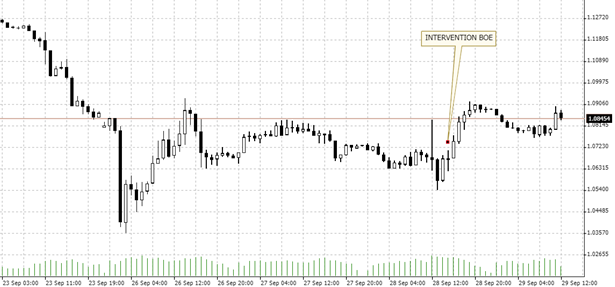

29.09.2022 – Continuing the sterling story: we have just seen another intervention. This time the Bank of England has supported the British pound by buying government bonds. And the British financial market along with it. Because apparently panic was running rampant among pension funds. The situation in the UK is so interesting because it could provide a lesson for what is flourishing in Euroland or the USA.
Powerful movement in the currency market: “Cable” has made an impressive turnaround, as you can see in the hourly chart. The reason: The Bank of England announced that it would ensure stability on the financial markets with a temporary programme to buy government bonds. The aim is to avert “material risks to the financial stability of the United Kingdom”. We had recently said in this space that it smelled like an intervention.

Source: Bernstein Bank GmbH
No wonder, it’s all about the big picture – systemic stability. The backdrop is the plans announced before the weekend to cut taxes, to the tune of £45 billion, to boost economic growth. We had just reported on this. London did not announce parallel spending cuts, which is why the planned measures are likely to push up the national debt.
Flight from Gilts
Investors reacted and fled from British bonds. Indeed, yields on British gilts have recently shot up sharply. The US television channel CNBC reported that the real reason for the intervention was the fact that pension funds were simply panicking. Some of the bonds held had lost about half their value in a few days. And the situation has not yet been cleared up for many fund managers – we suspect further intervention from Westminster or the BoE. Or a change in policy.
Away with QT
Antoine Bouvet, James Smith and Chris Turner, economists at the bank ING, expressed this view: “It would definitely be better if the central bank bought gilts in the long term and suspended quantitative tightening. This is exactly what the global financial market is hoping for, as the global chain reaction showed. US equities, for example, gained because the danger of contagion from Great Britain seems to have been averted for the time being. Commodities also benefited from the rising appetite for risk and the dollar pulled back.
The moral of the story: quantitative tightening and recession don’t mix. Perhaps we have just seen the first evidence from London that central banks will change course if necessary. After all, QT actually means the end of bond purchases so as not to inject capital into the market and thus fuel inflation. Bernstein Bank is keeping an eye on the situation for you!
The content of this publication is for general information purposes only. In this context, it is neither an individual investment recommendation or advice nor an offer to purchase or sell securities or other financial products. The content in question and all the information contained therein do not in any way replace individual investor- or investment-oriented advice. No reliable forecast or indication for the future is possible with respect to any presentation or information on the present or past performance of the relevant underlying assets. All information and data presented in this publication are based on reliable sources. However, Bernstein Bank does not guarantee that the information and data contained in this publication is up-to-date, correct and complete. Securities traded on the financial markets are subject to price fluctuations. A contract for difference (CFD) is also a financial instrument with leverage effect. Against this backdrop, CFD trading involves a high risk up to the point of total loss and may not be suitable for all investors. Therefore, make sure that you have fully understood all the correlating risks. If necessary, ask for independent advice. CFDs are complex instruments and are associated with the high risk of losing money quickly because of the leverage effect. 68% of retail investor accounts lose money trading CFD with this provider. You should consider whether you understand how CFD work and whether you can afford to take the high risk of losing your money.7
